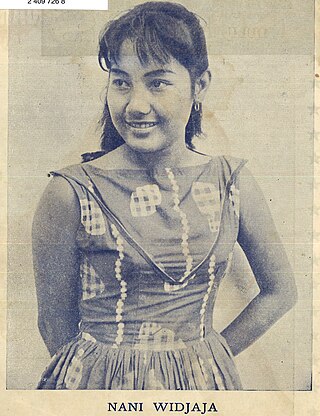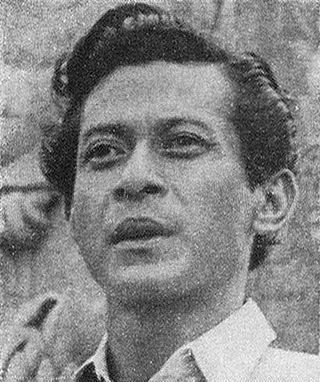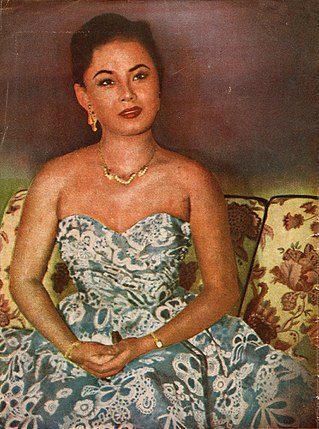
Lewat Djam Malam is a 1954 Indonesian film directed and produced by Usmar Ismail and written by Asrul Sani. Widely regarded as a classic of Indonesian cinema, the film follows an ex-soldier in his vigilante actions against corruption.
![<i>Zoebaida</i> 1940 [[Dutch East Indies]] film](https://upload.wikimedia.org/wikipedia/commons/thumb/4/41/Zoebaida_ad.jpg/320px-Zoebaida_ad.jpg)
Zoebaida is a 1940 film from the Dutch East Indies directed by Njoo Cheong Seng. A romance set in Timor, it starred Njoo's wife Fifi Young and was the film debut of Soerip. Shot over a period of 27 days in a Dutch-owned studio, the film received middling reviews. It is likely lost.

Lilik Sudjio was an Indonesian actor turned film director who won the Citra Award for Best Director in 1955 for his film Tarmina. He was involved in 74 feature film productions since his debut in Fred Young's Saputangan in 1949.
The Citra Award for Best Actress is an award given at the Indonesian Film Festival (FFI) to Indonesian actresses for their achievements in leading roles. The Citra Awards, described by Screen International as "Indonesia's equivalent to the Oscars", are the country's most prestigious film awards and are intended to recognize achievements in films as well as to draw public interest to the film industry.

Panggilan Darah is a 1941 film from the Dutch East Indies written and directed by Sutan Usman Karim and produced by Tjho Seng Han for Oriental Film. The black-and-white film starred Dhalia and Soerip as orphaned sisters trying to make a living in the colonial capital of Batavia before moving to Kudus to work at a clove cigarette factory.

Nani Widjaja was an Indonesian actress and model who won two Citra Awards for Best Supporting Actress. She was best known for her role in television Bajaj Bajuri. She was the part of Classical Indonesian Cinema.
Moestika dari Djemar is a 1941 film from the Dutch East Indies. Multiple modern sources also use the incorrect spelling Moestika dari Djenar, but contemporary sources uses an "m".

Hadidjah was an Indonesian film actress best known for partnership with Moh Mochtar in seven films released by Java Industrial Film between 1939 and 1941. She was the mother of Citra Award-winning musician Idris Sardi.

Mohamad Mochtar, usually credited as Moh Mochtar, was an Indonesian film actor active from 1939 until his death in 1981.

Mas Sardi was an Indonesian composer and musician notable for being the country's first professional music supervisor. He and his wife Hadidjah were the parents of Citra Award-winning musician Idris Sardi.

Ng. Ratu Djoewariah was an Indonesian actress active in the 1940s and 1950s.

Anastasya Soerip was an Indonesian singer and actress.

Rara Patma Dewi Tjitrohadiseikusumo, best known under her stage name Chitra Dewi, was an Indonesian actress and director. She was noted for her roles in Usmar Ismail's films of the 1950s, appearing in films such as Tamu Agung, Tiga Dara, and Pedjuang, although she remained active in cinema until 1993 and won a Citra Award for Best Supporting Actress at the 1979 Indonesian Film Festival for Gara-gara Isteri Muda. Dewi also had a brief stint film directing in 1971, making her one of only six Indonesian women to direct a film before 1998.
![<i>Pantjawarna</i> 1941 [[Dutch East Indies]] film](https://upload.wikimedia.org/wikipedia/commons/thumb/0/03/Pantjawarna_ad.jpg/320px-Pantjawarna_ad.jpg)
Pantjawarna is a 1941 film from the Dutch East Indies.

Oriental Film was a film production company in Batavia, Dutch East Indies. Established by ethnic Chinese businessman Tjo Seng Han in 1940, it completed four black-and-white films before it was closed in 1941. All the company's films were screened into the 1950s but may now be lost. They were directed by two men, Njoo Cheong Seng and Sutan Usman Karim, and launched the careers of actors such as Dhalia and Soerip.

Netty Herawaty was an Indonesian actress who made more than fifty films between 1949 and 1986.

Darussalam was an Indonesian actor who appeared in more than seventy films in his forty-year career. Born in Bengkulu, he studied to be nurse before migrating to theatre during the Japanese occupation of the Dutch East Indies, marrying Netty Herawaty while with the troupe Irama Masa. The couple spent the remainder of the occupation and the ensuing revolution touring the archipelago with a number of troupes. In 1949, Darussalam and Herawaty made their feature film debut in Fred Young's Saputangan, appearing in seven further Young productions before migrating to Djamaluddin Malik's Persari. During their eight years with the company, Darussalam and Herawaty travelled to the Philippines and Singapore and found popularity among audiences, though Darussalam remained in his wife's shadow.



![<i>Zoebaida</i> 1940 [[Dutch East Indies]] film](https://upload.wikimedia.org/wikipedia/commons/thumb/4/41/Zoebaida_ad.jpg/320px-Zoebaida_ad.jpg)









![<i>Pantjawarna</i> 1941 [[Dutch East Indies]] film](https://upload.wikimedia.org/wikipedia/commons/thumb/0/03/Pantjawarna_ad.jpg/320px-Pantjawarna_ad.jpg)


